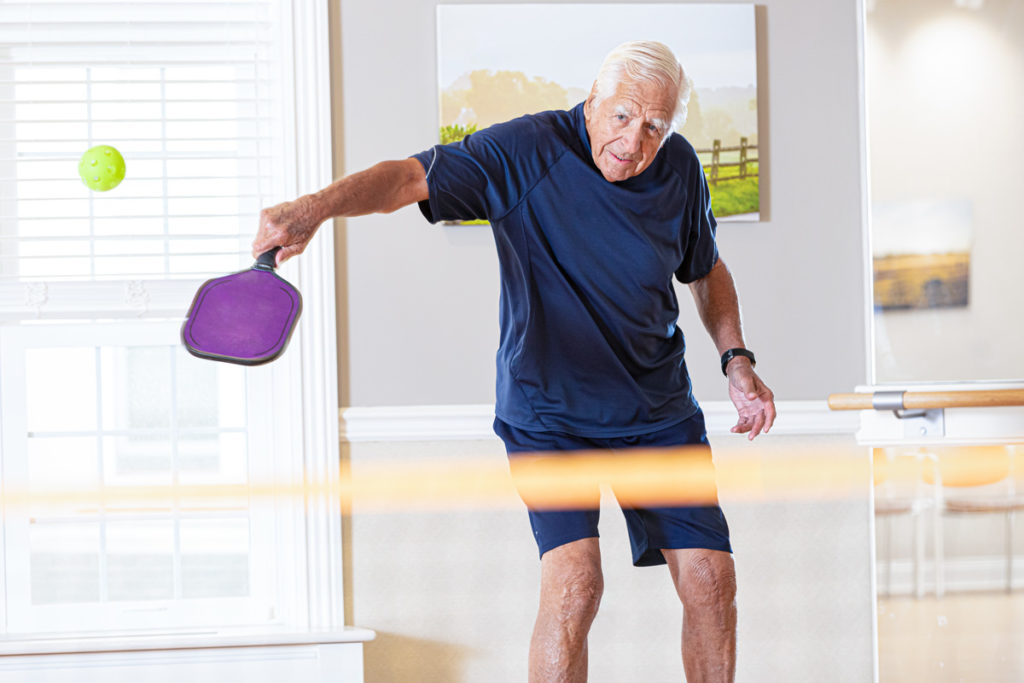The Rise of Pickleball
When Fred Mischler moved to The Hill at Whitemarsh two years ago with his wife Maureen, he was drawn to a relatively new sport with a strange name: pickleball. He noticed that the sport seemed like a cross between ping-pong and tennis and was easy to learn. Within a few months, Fred had a regular pickleball game going three days a week.
“The game is fast, and you can pick up the skills quickly,” says Fred. “You can even watch tutorials on how to play pickleball on YouTube! It’s really such a great sport. Very active and a great way to meet new people.”
Fred is not alone in his love of pickleball; there is a growing pickleball movement in America, especially among older adults. The USA Pickleball Association (USAPA) has found that the sport has seen a 650 percent increase in members since 2013, and as of 2018 had 3.1 million players in the U.S.
So what exactly is pickleball, and why is everyone so drawn to this new sport?
More Than 54 Years of Pickleball Fun
Just outside of Seattle on Bainbridge Island in the summer of 1965, friends Joel Pritchard, Bill Bell and Barney McCallum decided to invent a new game in an effort to ward off their children’s boredom. They created handmade equipment, put a list of rules together and used a tennis court to entertain their kids with this new game. Every so often, the Pritchards’ dog, Pickles, would chase a rogue ball and run off with it, eventually leading all of them to refer to the new game as “Pickleball.”
Over the years, pickleball has evolved from a makeshift backyard game to a national sport. The game is played on a badminton-sized court with a 34-inch high net in the middle. Using a wiffle ball and composite or wooden paddles that look like oversized ping-pong paddles, pickleball can be played indoors or outdoors, with either singles or doubles.
Games themselves are quick—taking only about 10 to 15 minutes to play–which means it doesn’t require as much of a time commitment as other leisure activities. This also makes it easier for people who aren’t in great shape or who are recovering from injuries.
“I played tennis throughout most of my adult life,” says Fred. “I wore out my knees and needed surgery to correct them. But pickleball allows to me to continue to be involved in a group sport and remain active.”
Smaller Court, Big Benefits
Aside from just being plain old fun, there are many benefits—physical and mental—to picking up the game of pickleball. Some of the proven benefits include:
Lower Levels of Depression
An article published in the May 2018 issue of the journal Leisure Studies details how researchers in Japan studied the effect that competing in pickleball tournaments can have on health and found that it is linked to lower levels of depression in older adults. According to the researchers, this could be due in part to the fact that the nature of the sport is incredibly social, thus lending itself to feeling more connected. Most people who play pickleball, including Fred, seem to agree that the game has a wonderful social aspect that can’t necessarily be found in other sports.
“The best part about pickleball is that anyone can do it,” says Fred. “You can get out and do something to stay active and involved. You’ll definitely stay healthier as a result.” “Group sports are fun to play and give you the opportunity to meet different people,” says Fred. “I’ve made great friends here at The Hill as a result of playing pickleball.”
 Better Cardiovascular Function
Better Cardiovascular Function
A 2018 study out of Western State Colorado University and published in International Journal of Research in Exercise Physiology found that regular pickleball games—defined by the researchers as playing at least three times a week for one hour—can improve blood pressure and cardiorespiratory fitness. Because of its moderate level of intensity, the researchers identified pickleball as being an ideal form of exercise for those who are over the age of 50.
Less Risk of Injury
Pickleball may be fast-paced, but since the games themselves only last about 15 minutes, players are provided plenty of opportunity to catch their breath or take a water break. Additionally, if you choose to play doubles, you’ll have more court coverage, which means less running and a lower probability of experiencing an injury.
